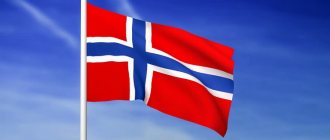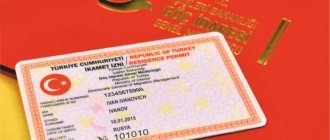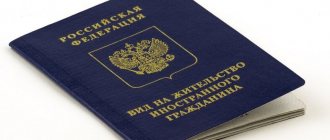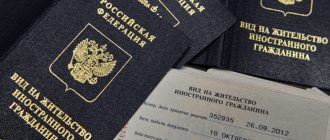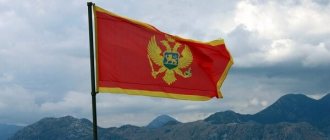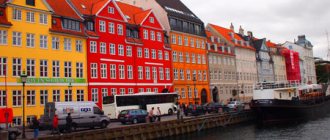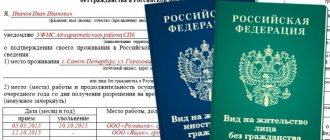How can a foreigner legalize his stay in the Russian Federation?
Migrants who arrived on the territory of the Russian Federation for further residence are required to declare themselves to the unit of the Main Directorate for Migration Affairs of the Ministry of Internal Affairs at their chosen place of residence.
At the initial stage, you will need to acquire temporary registration and collect a package of documents: only in this way will the migrant be able to legalize his status, obtain the right to work and freely cross the border.
Let's figure out how the migration laws of the Russian Federation regulate policy in this regard.
Features and differences of concepts
Legalization of residence of foreigners consists of several stages, each of which allows you to strengthen the rights of a migrant and subsequently become a full citizen of the Russian Federation.
First, you need to understand what the difference is between a residence permit and a temporary residence permit, because these are completely different concepts. RVP and residence permit are documents that allow you to live and work in Russia. Problems often arise with the difference between the concepts of “temporary stay” and “TRP”. The first does not allow you to stay in the Russian Federation for longer than 90 days (or the validity of the visa) and does not allow you to find a job without special permission. A temporary residence permit allows you to work and live in the country officially throughout the entire validity period of the document.
Temporary residence permit
If a foreign citizen plans to stay in the country for quite a long time, he needs to apply for a temporary residence permit. This status provides the following privileges:
- issued for three years;
- work without obtaining a patent or other permits;
- the opportunity to register your own companies and conduct other business activities;
- the opportunity to benefit from free medical care.
This is also the first mandatory step on the path to obtaining Russian citizenship. A separate document is not issued. After a positive decision is made, the following stamp is placed in the migrant’s passport:
This is what the RVP stamp looks like.
Note! You can remain in the country while your application for a temporary residence permit is being considered, even if the temporary residence permit expires.
Over the course of three years, a foreign citizen must make a decision: leave Russia or apply for the following status - a residence permit.
Resident card
A residence permit differs from a temporary residence permit in that it has much greater rights for a migrant; it gives its owner almost all the same rights that are provided for full-fledged citizens of Russia. While remaining a citizen of his country, the immigrant acquires the following rights:
- obtaining education, incl. for your children,
- receiving a pension,
- access to loans from Russian banks,
- free travel outside the state and entry back without a visa,
- residence and the right to work in any region of the country, without a patent or permit,
- access to free medicine in any subject of the Russian Federation,
- the possibility of obtaining Russian citizenship if necessary.
The restrictions are minimal - a ban on working in the civil service and voting in elections, as well as the need to periodically renew the permit (once every 5 years).
Thus, the main difference between a residence permit and a temporary residence permit is that a migrant in the first case has the right to permanently reside in a foreign country, being in many respects its citizen.
Permanent residence (permanent residence)
If we consider other countries, then, as a rule, a migrant’s right to permanent residence arises after his continuous residence in Russia for 3-6 years. There are other grounds for obtaining permanent residence, for example:
- Marriage to a citizen of this country;
- Investments in the state economy, etc.
In Russia, such a term as permanent residence is not used; in our country, a foreigner has the right to apply for a temporary residence permit, then a residence permit, and after that obtain citizenship.
Russian citizenship
In the Russian Federation, citizenship can be obtained at birth, or through a simplified scheme called naturalization. How fast the process of obtaining a Russian passport will be depends on the individual situation of the foreigner. The reasons for filing the application, the results of the exam to test knowledge of the Russian language, history and legislation of the Russian Federation, as well as the foreigner’s willingness to renounce the citizenship of the country from which he came will be important. Migrants will also need to provide proof of source of income.
The difference between temporary residence permit, residence permit and citizenship in 2021
The main difference between a temporary residence permit and a residence permit is the rights they represent.
| Citizens' rights | RVP | Residence permit |
| Validity period, extension | 3 years without possibility of extension | 5 years with the possibility of renewing several times |
| Possibility to use medical services | Free within the constituent entity of the Russian Federation where it has temporary registration | Free in any of the constituent entities of the Russian Federation |
| Right to pension | Absent | Eat |
| Prospects | Possibility to obtain a residence permit | Opportunity to obtain Russian citizenship |
| Crossing the Russian border | By multiple visa | Without a visa |
| Right to employment | You can work only within one subject of the Russian Federation in which the migrant has temporary registration | You can work in any subject of the Russian Federation; additional notification to the Main Directorate for Migration is not required. It is prohibited to hold positions of civil servants |
| Lending | Can't get a loan | You can get a loan |
| Education | No opportunity to get an education | There is an opportunity to get an education |
Important! After a foreigner submits documents for a temporary residence permit, he can stay in Russia for a long time, even more than 90 days.
Any adult foreign citizen has the right to receive a temporary residence permit; only certain categories of citizens can immediately apply for a residence permit without first obtaining a temporary residence permit. A simplified scheme is provided for the following persons:
- Citizens of the Republic of Belarus;
- Russian speakers languages whose ancestors lived in Russia;
- Highly qualified specialists, members of their families;
- Citizens who have the right to obtain Russian citizenship, but refused it for personal reasons.
The difference between residence permit and permanent residence
According to world practice, to obtain citizenship, a foreigner must go through the following stages of legalization: first obtain a residence permit, then permanent residence, and only then citizenship. The main difference between permanent residence and a residence permit will be the possibility of multiple visa-free border crossings, as well as the right to work without special documents. It is important to remember that each country has its own procedure for the legalization of foreign citizens.
The difference between permanent residence and citizenship
What are residence permits and permanent residence permits and how they differ from each other, we have already found out above. Now it’s worth understanding what the difference is between permanent residence and citizenship.
The rights of a permanent residence holder and a citizen of the country are almost identical, with the exception of the ability to participate in elections and voting; employment in government and, sometimes, military service is prohibited.
Since the differences are minor, many foreigners prefer to extend their permanent residence permit (if necessary). In addition, to obtain a passport, you must renounce the citizenship of your country, and permanent residence status allows you to retain the passport of your native state and not get involved in the bureaucratic red tape associated with acquiring citizenship.
Differences
The first difference is that obtaining a temporary permit gives a migrant the right to live and work only in the region of the Russian Federation where he was issued the permit. But this restriction, however, does not prohibit a foreigner from moving around the country, for example, for business trips or for his own needs.
The validity period of a temporary residence permit differs from the period of a residence permit, 3 years and 5 years, respectively. At the same time, it is impossible to extend the period of a temporary residence permit; it is issued once (except for exceptions), but the period of a residence permit can be extended as long as the foreigner himself wants.
Both documents allow a person to leave Russia and enter back without issuing additional papers, however, the holder of a temporary permit can stay outside the Russian Federation for no more than 6 months in a row, and the holder of a residence permit has no restrictions on crossing the border and length of stay outside of Russia.
| Rights | RVP | Residence permit |
| Validity | 3 years without possibility of extension | 5 years with the possibility of multiple extensions |
| Medical service | No | Yes |
| Right to education | No | Yes, including for children |
| Right to pension | No | Yes |
| Right to lending | No | Yes |
| Traveling within the territory of the Russian Federation | Unhindered | Unhindered |
| Place of residence | On the territory of the region of the Russian Federation that issued the temporary residence permit | In any region of the Russian Federation to choose from |
| Border crossing | By multivisa. The owner of a temporary residence permit can stay outside Russia for no more than 6 months in a row | No visa and no restrictions on time spent outside Russia |
| Place of employment | Only in the region of residence. Work without a patent | In any region of the Russian Federation |
| Perspective | Possibility of further application for a residence permit | Possibility of further registration of Russian citizenship |
Features of obtaining a residence permit without a temporary residence permit
Registration is possible in two ways: standard procedure and simplified (without temporary residence permit). The first option involves the difficulty of obtaining a permit, which is issued according to an established quota.
The second option is simpler, but not available to every applicant. Only citizens of Belarus, native speakers of Russian and several other categories are entitled to a simplified method of obtaining a document.
RVP: serious restrictions and short validity period
A temporary residence permit is issued in the following situations:
- when a migrant, for some reason, needs to live in the Russian Federation for several years;
- when a citizen of another country wants to obtain a residence permit in Russia, which in many situations requires a temporary residence permit.
A permit is not some kind of document or certificate. It is a mark (stamp) that is affixed to the national or foreign passport of a foreigner. A special document on obtaining permission is issued only to stateless people, due to their lack of a passport.
The status of a temporary resident is valid for 3 years . It is impossible to extend it. People who do not plan to stay in the Russian state for a long time must leave the country after this period. In the future, they can try again to get permission.
What rights do foreign citizens with a temporary residence permit receive?
If a person wants Russia to become his place of permanent residence, then, having become the holder of a temporary residence permit, he should take care in advance of the next stage - obtaining a residence permit.
A person from another state temporarily residing in the Russian Federation is subject to a number of obligations. The main thing is that the foreigner is strictly tied to the region and area in which he was issued a temporary residence permit. He cannot voluntarily go to live in another region or get a job in another city, which, of course, greatly limits his possibilities.
Benefits of a residence permit
The difference between a temporary residence permit and a residence permit is noticeable. The second status gives the migrant much more freedom - he is allowed to move and work in the city he wants. A person is endowed with almost the same rights as Russians. There are only a few exceptions that are not significant for most people: you cannot vote in elections and work in government agencies.
Unlike a temporary residence permit, a special document is already issued here. In shape and size it resembles a Russian passport. The booklet contains information about its owner, information about children under 14 years of age, and registration.
As of November 1, 2019, the residence permit was made indefinite and there is no need to renew it anymore. The state fee for registration is now 5,000 rubles.
Differences between RVP and residence permit
Due to the fact that the main goal of legalizing a foreign citizen is to legitimize his stay in Russia, obtain the right to official employment and freely cross the border, the difference must be sought, first of all, in the rights provided by these documents.
Table of differences between a temporary residence permit and a residence permit:
| Rights granted | Temporary residence permit | Resident card |
| Validity period and possibility of extension | 36 months without possibility of extension | 60 months, multiple extensions possible |
| Medical care | Free on the territory of the Russian region in which the foreigner is temporarily registered | Free in any region of the country |
| Pension provision | Absent | Eat |
| Status perspective | Possibility of applying for a residence permit | Possibility of applying for a Russian passport |
| Period of stay in Russia | 36 months | 60 months |
| Moving around the country | Unhindered | It is possible to change the address of residence on the territory of the state without the need to first notify the migration service |
| Entry into the country | By multiple visa | Visa-free |
| Employment | It is possible to find employment in the region of the country in which the foreigner is temporarily registered | It is possible to get a job without a patent; it is prohibited to hold a position as a civil servant |
| Getting a bank loan | No opportunity | Allowed |
| Getting an education | No opportunity | Allowed |
| Liabilities | Obtaining a visa allowing you to cross the border multiple times | Notifying the migration service about your location once every 12 months |
| The right to participate in political elections | Absent | Absent |
| Cancel status | Cancellation is carried out if a foreign citizen has stayed outside the country for more than 6 months | Cancellation is carried out if the foreigner has been absent from the country for a long time for six months |
Reference! Having submitted documents for a temporary residence permit, a foreigner can stay in Russia even after the period of ninety days established by law has expired.
Any foreign citizen who has reached eighteen years of age has the right to apply for a temporary residence permit at the initial stage of legalization Only special groups of people can obtain a residence permit immediately.
Is it necessary to issue a temporary residence permit?
If people come to the territory of the Russian Federation for the purpose of long-term, and later permanent, residence, it is important to obtain official status as quickly as possible. For many, prompt permission to work is important. Going through all the stages of legalization will take quite a long time: after submitting an application for a temporary residence permit, you need to wait 2 months, then live in Russia for a year and only then apply for a residence permit. With this status, you can already freely work and live in the country, but if a migrant wants to obtain citizenship, he again needs to go to the migration department of the Main Directorate for Migration.
The standard registration procedure involves sequential completion of all stages, but there are categories of citizens for whom a preferential residence permit is available, without the need to obtain a temporary residence permit. These include:
- citizens of Belarus, as a country with which a mutual agreement has been concluded. Belarusians can apply for a residence permit after registering for migration. Applications are processed within three months, which is one month less than the generally accepted period;
- citizens recognized as native speakers of the Russian language. First of all, this means that the foreign citizen is fluent in the language and correctly understands complex expressions and terms. Documentary evidence of status can be a certificate or diploma (received before September 1, 1991), a certificate of past residence in Russia, etc.;
- highly qualified specialists (HQS) who are in the country on a work invitation. A residence permit (in this case) is issued only for the duration of the contract. At the end of it, the person has another month to conclude a new contract or leave the country;
- for HQS there are exceptions based on kinship, because members of their families also have the right to expedited registration of a residence permit. The exception is that relatives include not only children and parents, but also grandparents, spouses of children, etc.;
- citizens who have the right to obtain citizenship, but for some reason do not want to obtain it (they do not want to renounce their existing citizenship, serve in the Armed Forces, etc.).
Which is better: temporary residence permit or residence permit, everyone decides according to their own needs. The format and list of documents are approximately the same. A temporary residence permit has more restrictions and a limited validity period. After three years it cannot be extended. Migrants must leave the country, but can then return and reapply for a temporary residence permit.
Russian legislation simplifies the process of obtaining statuses for foreign citizens as much as possible. Thus, students who graduate from higher educational institutions receive a temporary residence permit without a quota, and holders of diplomas with honors can immediately apply for a residence permit.
Residence permit without temporary residence permit
Very often, people who come to Russia are interested in the question of whether it is possible to obtain a residence permit without obtaining a temporary residence permit, since going through all the stages of legalizing the residence of a foreigner in Russia takes a fairly long period of time and, naturally, the migrant has a desire to reduce it.
As usual, a residence permit can be obtained by a foreign person who has permission for a temporary temporary residence permit, however, for a number of migrants there are some relaxations and simplification of the procedure for obtaining a residence permit:
- Citizens of the Republic of Belarus. A mutual agreement has been concluded between Russia and Belarus, according to which citizens of the states can write an application for a residence permit immediately after completing migration registration. The review period for such applications is shorter than usual and is only 3 months;
- Native speakers of Russian. This means that a foreigner must be fluent in Russian, understand the subtext of expressions, and be able to correctly interpret texts of varying complexity. In addition, the migrant will have to prove that his direct ancestor or he himself previously lived on the territory of the Russian Federation;
- Highly qualified specialists who were invited to work in Russian companies. Upon expiration of the employment contract, the person must find a new job within a month or return to his country;
- Relatives of specialists, which include not only children and spouses, but also parents, grandparents, grandchildren, spouses of children and parents;
- Persons who are eligible for citizenship but do not wish to obtain it. The reason for reluctance does not matter: it can be either the possibility of losing the citizenship of one’s country or the reluctance to do military service.
The difference between temporary residence permit, residence permit and citizenship in 2021
The main difference between a temporary residence permit and a residence permit is the rights they represent.
| Citizens' rights | RVP | Residence permit |
| Validity period, extension | 3 years without possibility of extension | 5 years with the possibility of renewing several times |
| Possibility to use medical services | Free within the constituent entity of the Russian Federation where it has temporary registration | Free in any of the constituent entities of the Russian Federation |
| Right to pension | Absent | Eat |
| Prospects | Possibility to obtain a residence permit | Opportunity to obtain Russian citizenship |
| Crossing the Russian border | By multiple visa | Without a visa |
| Right to employment | You can work only within one subject of the Russian Federation in which the migrant has temporary registration | You can work in any subject of the Russian Federation; additional notification to the Main Directorate for Migration is not required. It is prohibited to hold positions of civil servants |
| Lending | Can't get a loan | You can get a loan |
| Education | No opportunity to get an education | There is an opportunity to get an education |
Important! After a foreigner submits documents for a temporary residence permit, he can stay in Russia for a long time, even more than 90 days.
Any adult foreign citizen has the right to receive a temporary residence permit; only certain categories of citizens can immediately apply for a residence permit without first obtaining a temporary residence permit. A simplified scheme is provided for the following persons:
- Citizens of the Republic of Belarus;
- Russian speakers languages whose ancestors lived in Russia;
- Highly qualified specialists, members of their families;
- Citizens who have the right to obtain Russian citizenship, but refused it for personal reasons.
How can a temporary resident citizen obtain a residence permit?
A temporary residence permit in most cases is the first step, followed by obtaining a residence permit and then a Russian passport.
However, some foreigners can skip the first step and immediately obtain a residence permit. This simplification is available:
- people whom the state has recognized as native speakers of the Russian language. For this category of citizens, a residence permit is issued only for three years, after which it is necessary to obtain citizenship;
- citizens of the Republic of Belarus>;
- migrants working in Russia by invitation and recognized as highly qualified specialists>;
- those who were born in the RSFSR. But there is a condition here - it is necessary that the applicant also had Soviet citizenship in the past;
- visitors who have close Russian relatives living in Russia. You can apply immediately for a residence permit if you have Russian parents, a son or daughter. The age of the relative does not matter;
- citizens who have studied full-time at a higher educational institution located in Russia. The basis applies only to those who graduated from a university with honors;
- specialists who, at the time of obtaining a residence permit, have already been working in their profession for six months, provided that during this entire period the employer made deductions required by law;
- applicants who have lost their Russian citizenship;
- some stateless persons.
Sources
- https://immigrationtorussia.com/vnzh/poluchenie-rvp/rvp-vnj-grajdanstvo-v-chem-raznica
- https://emigrant.expert/rvp/vnzh
- https://pasporta.org/grazhdanstvo/rvp-i-vnzh-v-chem-raznica/
- https://ProGrazhdanstvo.ru/rvp/chem-otlichaetsya-ot-vnzh.html
- https://migranty.info/raznica-mezhdu-rvp-vnzh-i-grazhdanstvom-v-2018-godu/
- https://MigrantuRus.com/rvp-vid-na-zhitelstvo/
- https://proRVP.ru/rvp-i-vnzh-v-chem-raznica.html
Resident card
From November 2021, the residence permit is issued for an indefinite period. This is the second stage of obtaining Russian citizenship. But that’s not all - a residence permit gives many rights, which in many aspects are identical to the rights of Russian citizens. The main ones:
- participation in social programs;
- the opportunity to receive free education;
- open companies with authorized capital;
- purchase real estate and register at the address;
- use lending programs, including mortgages;
- receive a pension and other social benefits;
- live in any region of the country and work in any subject of Russia;
- free entry/exit from the country, the ability to issue invitations to family members and relatives, etc.
If the decision is positive, the citizen receives the following document:
This is what a residence permit looks like
Important! The residence permit does not need to be renewed, but it is necessary to send a notification every year confirming the intention to continue to reside in the country.
